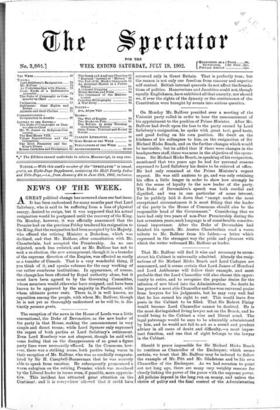The reception of the news in the House of Lords
was a little conventional, the Duke of Devonshire, as the new leader 'of the party in that House, making the .announceMent in very simple and direct terms; while Lord Spencer only expressed the regret of both parties at Lord Salisbury's retirement. Even Lord Rosebery was not eloquent, though he said with some feeling that on the disappearance of so great a figure party lines were necessarily effaced. In the Commons, how- ever, there was a striking scene, both parties being warm in their reception of Mr. Balfour, who was so cordially congratu- lated by Sir H. Campbell-Bannerman that he was scarcely able to speak from emotion—. He subsequently pronounced a warm eulogium on the retiring Premier, which .was re-echoed by the Liberal leader in terms even, if possible, more apprecia- tive. _This incident has- attracted great' attention. on' .the COatinent, and • it is everywhere..allowed that it daiild• hive'
occurred only, in Great Britain. That is perfectly true; but the reason is not only our freedom from rancour and superior self-control. British internal quarrels do not affect the founda- tions of Politics. Hanoverians and Jacobites could not, though equally Englishmen, have exhibited all that amenity, nor should we, if ever the rights of the dynasty or the continuance of the Constitution were brought by events into serious question.


































